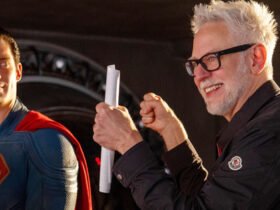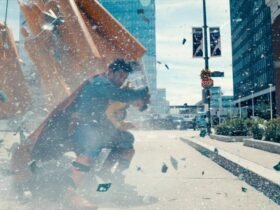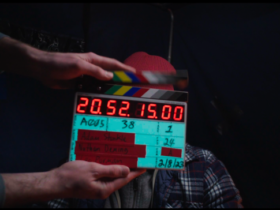“They challenged me to write whatever I want, and they’d figure out how to make it into a play,” Trefry recalls. “So I was like, ‘Okay, let me just throw down this gauntlet.’ I was kind of testing to see what the limits of the stage were, because it seemed so impossible what I wanted to do. But they went crazy for it because it was so audacious.”
Audacity might be the guiding star for every aspect of The First Shadow. Obviously co-directors Stephen Daldry and Justin Mark immediately warmed to the idea of doing a riff on the Philadelphia Experiment, complete with the familiar silhouette of the Mind Flayer, yet everything about this production is massive, with stars of the production comparing it to doing an Olympic marathon on stage every night. This ranges from the massive ensemble cast of 34 players to a veritable village of costumers, stagehands, techies, and various other crew members always scrambling behind the scenes.
“Physically, what this show requires of us, does not feel like a normal play,” says Alison Jaye, who stars in the show as a young Joyce Maldonado (later Byers). “If anything it feels closer to a musical, but even then, like a steroid version of anything you’re seeing on stage.”
It is in fact one of the most spectacular theatrical experiences this writer has viewed in terms of stagecraft and visual illusion. As writer Trefry surmises, “The images, if they were strong enough, would catch on like a disease. And once everyone was infected, every department couldn’t help but get obsessed with trying to make it work.”
Yet what might be more impressive is that for as much obvious visual panache as a Stranger Things production must sport, there is a similar narrative ambition at work in First Shadow as well. Not only is the play an original story set in 1950s Hawkins—back before Eleven, Max, and Steve the Babysitter—but it is one suffused with as much emotional pathos and dread as the series. It even centers its narrative on the most monstrous creation from Season 4, if not the whole series: young Henry Creel, the boy who would grow up to be Vecna, played on stage by the now Tony-nominated Louis McCartney.
“Knowing where the TV show goes, it was fun to conceive a play that is in its heart a tragedy, which is so different tonally from the show,” Trefry says of her Vecna protagonist. It’s a subtle but profound aesthetic detour, and one which invites even the staunchest Stranger Things into the truly unknown. Here the shadows are deep—and perhaps revealing about the still developing season 5.









Leave a Reply